牛津英语沪教版6A期末复习 词性转换归纳
牛津英语沪教版6b词性转换归纳.docx
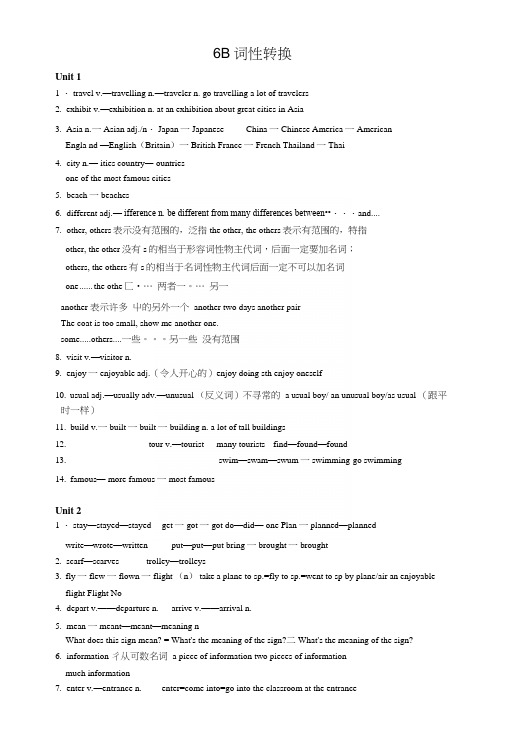
6B词性转换Unit 11 ・ travel v.—travelling n.—traveler n. go travelling a lot of travelers2.exhibit v.—exhibition n. at an exhibition about great cities in Asia n.一Asian adj./n・ Japan一Japanese China一Chinese America一AmericanEngla nd —English(Britain)一British France一French Thailand一Thai4.city n.— ities country― ountriesone of the most famous cities5.beach一beaches6.different adj.—ifference n. be different from many differences between••・・・and....7.other, others表示没有范围的,泛指the other, the others表示有范围的,特指other, the other没有s的相当于形容词性物主代词,后面一定要加名词;others, the others有s的相当于名词性物主代词后面一定不可以加名词one ...... the othe匚•… 两者一。
… 另一another 表示许多屮的另外一个another two days another pairThe coat is too small, show me another one.some.....others....一些。
另一些没有范围8.visit v.—visitor n.9.enjoy一enjoyable adj.(令人开心的)enjoy doing sth enjoy oneselfual adj.—usually adv.—unusual (反义词)不寻常的a usual boy/ an unusual boy/as usual (跟平时一样)11.build v.一built一built一building n. a lot of tall buildings12. tour v.—tourist many tourists find—found—found13. swim—swam—swum一swimming go swimming14.famous— more famous一most famousUnit 21 ・ stay—stayed—stayed get一got一got do—did— one Plan一planned—plannedwrite—wrote—written put—put—put bring一brought一brought2.scarf—scarves trolley—trolleys3.fly一flew一flown一flight (n) take a plane to sp.=fly to sp.=went to sp by plane/air an enjoyableflight Flight No4.depart v.——departure n. arrive v.——arrival n.5.mean一meant—meant—meaning nWhat does this sign mean? = What's the meaning of the sign?二What's the meaning of the sign?rmation 彳从可数名词a piece of information two pieces of informationmuch information7.enter v.—entrance n. enter=come into=go into the classroom at the entranceexit v.—exit n・exit=go out the classroom at the exit8.busy adj.一business n.—businessman n. —businesswoman n. be busy doing sth=be busywith sthOn business (做生意)一business hours(工作吋间)go on a business tripUnit 31 .celebrate v.一celebration n・ celebrate my twelfth birthday to celebrate the Dragon Boat Festival2.something pron.—否定句中anything—否定no thingI would like to know something about the Festivals I would not know anything about the Festival.I would know nothing about the Festival.3.die n— ead adj.— eath n. die— ied一died have/has/been dead for3.take-took-taken take one's advice=listen to sb. give-gave-given give onHs advice4.advice n.(不可数名词)-advise v. A piece of advice two pieces of advice5.salt n.-salty adj. need a little salt a salty rice dumpling6.with prep.-without without having breakfast二without breakfastsalty rice dumplings with meat sweet rice dumplings without beanste a. -later adv. two days laterS.danger n. — dangerous adj・ Be in danger Will be in danger A dangerous driver9.lose- lost- lost Lose a battle Lost a battle 否定:didn't lose a battleLose one's life=die10-send- sent- sent send sb. sth.=send sth. to sb.II・sandwich n. 一sandwiches12.photo・ photosUnit four1・ health n.-healthy adj. 一healthier - healthiest - unhealthy2.health problem be healthier than be as healthy asbe less healthy than = be not as/so healthy askeep healthy = stay healthyhe is healthier than I.=I am less healthy than he. = I am not as /so healthy as he.3.sing v. - sang 一sung - singer 一song4.dance v・一dancer n.5.run v. 一ran 一run 一runner6.real adj. — really adv. True adj. 一truly adv. Really= truly Really/truly sorry7.swim- swam-swum-swimmer enjoy swimming8.collect v.- collection n. enjoy collecting stamps/a collection of stamps9.fly v.- flew - flown - flight n. fly kites an enjoyable flight10.head n.-headache n. have a headache11 • tooth n.-teeth pl.-toothache have toothache12.have a stomachache have a bad cold have a fever have a sore throat have a cough13.little- few- fewest much- more- most many- more- most14.suggest v. 一suggestion n.Unit 51 ・change v・/n. 一changeable adj. change a lot=have a great change changeable weather2.possible adj.-possibly adv. possibly=maybe=perhaps my possible future3.weigh v.-weighed 一weighed-weight n.-heavy adj. the same weight as=as heavy asHow much do you weigh?= What's your weight?=How heavy are you? heavy-heavier-heaviest rain heavily=a heavy rain(—场大雨,雨是不可数名词)4.high adj.-height n.tall adj.(人的身高用tall) as tall as=the same height as taller than before5.final adj.-finally adv. finally=in the end=at last final exam6.beautiful 一more beautiful -the most beautiful dance beautifully7.bake v.-baker n.=bakery n. work in the bakeryA baker bakes bread and cakes・ A baker^s job is to bake bread and cakes.8.report v.=reporter n. report the news write reports9.slim adj. — slimmer-slimmest thin-thiner-thinnestfat-fatter - fattest strong - stronger 一strongest10.agree -disagree v . agree with sth agree to do sth11 • suggest v. 一suggestion n.12. glass n.-glasses n. a pair of glass two pair of glasses wear glass with glassUnit 71 .Travel v. travelling n. -traveler n.二visitor二touristWhat will travelling in garden city be like in 10 years9 time ?=How will travelling in garden city be in 10 years9 time ?(动名词作主语)Travelling in shanghai has changed a lot.(动名词做主语谓语动词要用单数)2.air-conditioned adj. -air-conditioner n.There were no air-conditioned buses.=There were not any air-conditioned buses •3.Collect v.-collection n. collect shells /stamps / coins/ collect money from the passengers4.both-neither all 一none both and=not only ・•・but alsoneither ・・.nor either ...or (或者。
沪教版6A牛津英语期末知识点整理

目录第一部分:课文要点回首 (2)Unit 1 Family and relatives (2)Unit 2 I have a good friend (3)Unit 3 Spending a day out together (5)Unit 4 What would you like to be? (6)Unit 5 Open day (7)Unit 6 Going to school (8)Unit 7 Rules round us (9)Unit 8 The food we eat (10)Unit 9 Picnics are fun (11)Unit 10 Healthy eating (12)第二部分:上海牛津英语6A 短语总汇 (13)第三部分:改写句子常考整理 (16)第四部分:语法点索引 (18)1、疑问词 (18)2、必背不行数名词 (21)3、神态动词 (21)4、不定代词 (22)5、介词 (23)6、时态 (25)第一部分:课文要点回首Unit 1 Family and relatives1. This is my grandfather. 这是我的(外)祖父。
These are my family and relatives. 这些是我的家人和亲戚。
注意句中各成分保持单复数同形。
2.I?m their son.. 我是他们的儿子。
We’re their sons.我们是他们的儿子。
3.sth. from sb. 某物来自某人。
This is a birthday card from my friend. 这是一张来自我朋友的诞辰卡片。
4. Happy birthday to sb. 祝某人诞辰快乐。
5. one of your family members你的家庭成员之一。
6. How many uncles do you have? 你有多少个叔叔?one of 后边应接可数名词的复数形式。
牛津上海版英语六年级上期末复习-句型转换50题(含答案)
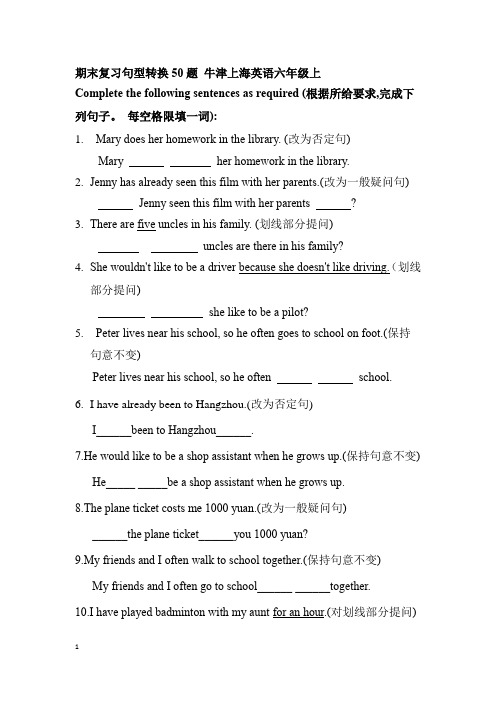
期末复习句型转换50题牛津上海英语六年级上Complete the following sentences as required (根据所给要求,完成下列句子。
每空格限填一词):1.Mary does her homework in the library. (改为否定句)Mary her homework in the library.2.Jenny has already seen this film with her parents.(改为一般疑问句)Jenny seen this film with her parents ?3.There are five uncles in his family. (划线部分提问)uncles are there in his family?4.She wouldn't like to be a driver because she doesn't like driving.(划线部分提问)she like to be a pilot?5.Peter lives near his school, so he often goes to school on foot.(保持句意不变)Peter lives near his school, so he often school.6.I have already been to Hangzhou.(改为否定句)I______been to Hangzhou______.7.He would like to be a shop assistant when he grows up.(保持句意不变)He_____ _____be a shop assistant when he grows up.8.The plane ticket costs me 1000 yuan.(改为一般疑问句)______the plane ticket______you 1000 yuan?9.My friends and I often walk to school together.(保持句意不变)My friends and I often go to school______ ______together.10.I have played badminton with my aunt for an hour.(对划线部分提问)______ ______have you played badminton with your aunt?11.find out,likes,want to,the doctor,job, if,the students,his(连词成句)___________________________________________________________ 12. He must arrive there on time. (改为否定句)He ______ arrive there on time.13. Simon has some good news to share with us.(改为一般疑问句)______ Simon ______ ______ good news to share with us?.14. My parents watered the flowers in their garden three times a month.(对划线部分提问)______ ______ ______ your parents water the flowers in their garden? 15.The teacher said to us, "Don't throw rubbish in public places.”(保持句义基本不变)The teacher told us ______ ______ throw rubbish in public places.16.for a coffee, after work, you, go out, 8o, with your friends (连词成句)__________________________________________________________ 17.The fried chicken wings taste salty and delicious.(改为一般疑问句the fried chicken wings salty and delicious?18.we can use the classroom on the second floor(就划线部分提问)can we use?19. It took Simon two hours to get to the library by bike.(就划线部分提问)How it take Simon to get to the library by bike? 20.How about drinking some juice after sports?(保持句意不变)we drink some juice after sports?21. Potatoes are cheaper than tomatoes.(保持句意不变)Potatoes expensive as tomatoes.22.i s,a ;fun,what, It, picnic,have,to(连词成句)23. Mary does her homework in the library. (改为否定句)Mary ________ ________ her homework in the library.24. Jenny has already seen this film with her parents. (改为一般疑问句)________ Jenny seen this film with her parents ________?25.There are five uncles in his family. (划线部分提问)__________ __________ uncles are there in his family?26. She wouldn’t like to be a driver because she doesn’t like driving. (划线部分提问)__________ __________ she like to be a pilot?27. Peter lives near his school, so he often goes to school on foot.(保持句意不变)Peter lives near his school, so he often______ ________school.28. Our school has rules in the library.(改为一般疑问句)______ your school ______ rules in the library?29. How much were the vegetables in the market?(保持句意不变)How much ______ the vegetables ______ in the market? 30.. We will go to the supermarket by bus.(对划线部分提问)______ ______ you go to the supermarket?31.The boy’s diet is very healthy. The girl’s diet is not very healthy.(合并句子)The girl’s diet is ______ healthy ______ the boy’s diet.32. late, not, must, be, for, you, again, school(连词成句)______________________________________________________ ____________________33.I cleaned my room yesterday.(用tomorrow改写)I _______ ________ my room tomorrow?34.You mustn’t pick flowers in the park.(句意相同)__________ _______ flowers in the park.35.We must use the lift on the right.(划线提问)________ ________ must we use?36.We need a little fat every day. (划线提问)________ _______fat do we need every day?37.Would you like some coffee? (否定回答)_______, _______.38.I can tell your telephone number and e-mail address.(改为一般疑句)you tell my telephone number e-mail address ? 39.. He's never been late for school.(改成反义疑问句)He's never been late for school, __ ?40.. The parents are going to have a talk with the teachers in theclassroom.(改为否定句)The parents _ a talk with the teachers in the classroom.41. The story book cost my father 50 yuan.(改为同义句)My father 50yuan the story book.42.Samuel would like to be a doctor because he likes to make sick peoplebetter.(根据划线部分提问)_________ Samuel like to be a doctor?43. He often has plenty of steamed chicken with rice. (对划线部分提问)How _______ steamed chicken with rice ______ he often have?44. Don't pick the flowers!(保持句意不变)We ______ ______pick the flowers!45. I'd like a piece of pizza.(改为一般疑问句)_____ _____ like a piece of pizza?46. Please talk about it in English.(改为否定句)_____ _____ about it in English.47. The lady got there by underground.(对划线部分提问)_____ _____ the lady get there?48. spent ten yuan on this pen.(同义转换)This pen ten yuan.I ten yuan for this pen.49. How much is it?(同义转换)How much it ?50. Mary is their English teacher.(同义句转换)Mary English.Key . 1. doesn't do 2. Has yet 3. How many 4. Why wouldn't5. walks to6-10 haven’t; yet/ wants to/ Does;cost/ on foot /How long 11: The students want to find out if the doctor likes his job.12-15 .needn’t Does, have any How often did not to16.Do you go out with your friends for a coffee after work?17-21. do take,which classroom , long did ,why not ,aren’t as22. what fun it is to have a picnic!23-27 . doesn’t do Has yet How many Why wouldn’t walks to 28. Does , have 29. did , cost 30. How will 31. less than32. You must not be late for school again.33. will clean 34. Don’t pick 35. Which lift 36. How much37.No, thanks.38.Can; or 39.has he 40.won’t ; have 41.spent on 42.why would 43.much does 44.mustn’t pick 45.would you 46. Don't talk 47.How does 48.cost me; paid 49.does cost 50.teaches them。
上海牛津英语六年级上学期词性转换期末复习

Oxford6A词性转换1.shop n.商店sho p v.购物2.other adj.其他的others pron.其他的人或物3.friend n.朋友friendly adj.友好的4.help v.帮助helpful adj.有帮助的5.pollute v.污染pollution n.污染6.discuss v.讨论discussion n.讨论e v使用reuse v.再利用8.promise v.承诺;保证promise n.诺言9.lie n.谎言lie v.躺10.write v.写writer n.作者11.visit v.拜访;参观visit n.拜访;参观12.luck n.运气lucky adj.幸运的luckily adv.13.plan v.计划plan n.计划;平面图14.cost v.花费cost n.花费15.swim v.游泳swimmer n.游泳者ual adj.通常的usually adv.通常17.teach v.教teacher n.教师18.drive v.驾车driver n.司机19.fire n.火fireman n.消防队员20.post v.邮寄po s t man n.邮递员21.cook v.烹饪cook n.厨师cooker n.炊具22.work v.工作work n.工作worker n.工人23.enter v.进入entrance n.入口处24.final adj.最后的finally adv.最后25.invite v.邀请invitation n.请柬26.meet v.遇见meeting n.会议27.loud adj.大声的loudly adv.大声地28.mean v.表示……的意思meaning n.意义29.cross v.横穿across prep.穿过;在对面30.steam v.蒸st e ame d adj.31.fry v.炒,煎,炸fried adj.32.boil v.煮boiled adj.33.bake v.烤b ak ed adj.34.freeze v.结冰;冷冻frozen adj.冰冻的35.favourite n.最喜欢的人或物favourite adj.最喜欢的36.fun n.有趣的事funny adj.有趣的;滑稽的37.spice n.香料spicy adj.辛辣的38.salt n.盐salty adj.咸的39.taste v.品尝tasty adj.美味的40.drink v.喝drink n.饮料41.sweet adj.甜的sweets n.糖果42.health n.健康healthy adj.健康的unhealthy adj.不健康的43.eat v.吃eating n.饮食44.suggest v.建议suggestion n.建议45.score n.分数score v.计分46.shop--shopping swim--swimming put—putting plan—planningge t—getting travel—travellingcycle—cyclingleave—leavingpollute—pollutingprepare—preparingcomp are—comparing 47.one—first two—second three—third four—fourth five—fifth six—sixth seven—seventh eight—eighth nine—ninthten-tenth eleven—eleventh twelve—twelfth fourteen—fourteenth nineteen—nineteenth twenty—twentieth thirty—thirtieth forty—fortieth fifty—fiftieth学习必备欢迎下载ninety—ninetiethhundr ed—hundr edth48.主格(做主语的词):I we you he she it they 宾格(做宾语或放于介词后):me us you him her it them 形容词性物主代词(放于名词前):my our your his her its their 名词性物主代词:mine ours yours his hers its theirs49.形容词原级,比较级,最高级small smaller the smallesttall taller the tallestbig bigger the biggestthin thinner the thinnestfat fatter the fattestheavy heavier the heaviest healthy healthier the healthiest long longer the longestwide wider the widestgood better the bestbad worse the worst50.名词单数复数child childrenfoot feett oot h teethmouse mice 名词单数复数fireman firemen po s t man po stme n person peoplesheep sheep fish fish deer deer Chinese Chinese Japanese Japanesetomato t omat oe s po t at o potat oes photo phot o s piano pianosfamily families activity activities factory factories secretary secretaries library librariesbus buses box boxes chilli chillies sandwich sandwiches quiz quizzesman menw oman w o me n policewoman policewomen *注:n.名词adj.形容词v.动词adv.副词prep.介词pron.代词学习必备欢迎下载。
(完整版)沪教版牛津英语六年级基础语法复习整理

形容词比较级最高级<一>规则变化A. 单音节和不可拆双音节形容词1.以e结尾+r / sthuge-huger/hugestlarge- larger- largestsafe- safer- safest2.辅音字母+y结尾:去y + ier / iestheavy-heavier-heaviestdirty- dirtier- dirtiesthappy-happier-happiestearly-earlier-earliestfriendly-friendlier-friendliestangry-angrier-angriesthealthy-healthier-healthiesteasy-easier-easiest3.重读闭音节,以一个元音字母加一个辅音字母结尾:双写辅音字母+ er,est big-bigger- biggestfat- fatter- fattestthin- thinner- thinnesthot- hotter- hottestwet- wetter- wettestred- redder- reddeststrong young old short clever newgreattallhighcheappoorrichsmallslowfastlightB. 部分双音节形容词, 多音节形容词famous- more famous- the most famousmodern – more modern – the most moderncareful- more careful- the most carefulbeautiful-more beautiful-the most beautifulexpensive – more expensive (less expensive)- the most expensive interesting- more interesting- the most interesting<二>不规则变化good/well-better –bestbad/badly/ill-worse-worstlittle-less-least + u. n. (few-fewer-fewest) + c. n.many/much-more –mostfar-farther-farthest (距离)far-further-furthest(程度)<四>too, very, quite, so, as…as,not as /so…as, less …修饰形容词原级very/quite tall(很高),too tall(太高)so tall(如此高)as tall as(与某人一样高)not as tall as /not so tall as(不如某人高)= less tall注意事项:1、形容词最高级前必须加the;副词最高级前可加the,也可不加thee.g. the biggest cities;draw (the) best2、much可修饰比较级:……得多e.g. much taller ……高得多3、原级标志:very非常;too太;quite相当;(not)as+原级+as (不)像……一样;less+原级不如……;so如此(共五个)时态填空(一) 常用固定词组:A型. doinglike doing/ love doing/ enjoy doing 喜欢做某事hate doing 讨厌做某事finish doing 完成做某事practise doing练习作某事start doing / begin doing开始做某事What about doing…? / How about doing…? 做某事怎么样?be good at doing善于做某事be poor at doing不善于做某事Sb. spend(s) some time doing sth. 某人花时间做某事remember doing记住做过某事forget doing忘记做过某事see sb. doing看见某人正在做by doing通过做某事by not doing通过不做某事stop doing停止做某事instead of doing而不是做某事go doingB型. to dowould like to do / want to do想要做某事forget to do忘记要做某事remember to do 记得要做某事have/has to do不得不做某事had to do不得不做某事will have to do将不得不做某事plan to do计划做某事One's job is / was to do... 某人的工作是做某事like to do/love to do喜欢做某事start to do / begin to do开始做某事need to do需要做某事don’t need to do/ don’t have to do不需要做某事learn to do学习做某事promise to do / promise not to do保证做某事/保证不做某事tell sb. to do / tell sb. not to do 告诉某人做某事/告诉某人不做某事ask sb. to do / ask sb. not to do 叫某人做某事/叫某人不做某事It takes/took sb. some time to do sth.某人花时间做某事It’s time to do sth. 做某事的时间到了C型. doLet sb. do让某人做help sb. (to) do帮助某人做Why not do...? 为何不做......?would rather do / would rather not do 宁愿做/宁愿不做had better do / had better not do最好做/最好不做can do能做may do可以做must do必须做will do 将要做would do想要做shall do 应该做should do应该做can't do不能做may not do 不可以做mustn't do不准做won't do将不做wouldn't do将不做shan't do将不做shouldn't do 不应该做needn’t do 不需要做(二) 五种常见时态:现在进行时公式:am/is/are +doing (现在分词)时间状语:now 现在listen 听look 看these days 最近eg.Look, they are planting trees.一般现在时(助动词do/does)公式:V. / V.+s/es/ies (动词原形或动词第三人称单数)时间状语:always 一直usually 经常often 常常sometimes 有时候once a week 每周一次four times a day 一天四次every year 每年How often 多久一次e.g.I usually take an underground to school.He often takes a bus home.一般过去时(助动词did)公式:V. +d/ed/ied或不规则(动词过去式)时间状语:yesterday 昨天yesterday evening 昨天晚上ten years ago 十年前last week 上个星期in the past 在过去just now 刚才e.g.Ten years ago, he moved to Japan.I sent a letter just now.4. 一般将来时(助动词will/shall)公式:am/is/are going to +V. , will /shall +V. 时间状语:tomorrow 明天next week 下个星期this weekend 这个星期in the future 在将来Soon 很快,不久in 15 years’ time 在15年后How soon 多久以后e.g.I will fly to America tomorrow.现在完成时(助动词have/has)公式:have/has +done (过去分词)时间状语:already 已经yet 尚never 从未ever 曾经just 刚才once 一次before 在......之前for 6 years 6年how long 多久e.g.I haven’t read this newspaper yet.Mary has already packed her things.。
牛津上海版(试用本)六年级英语上册词转专题
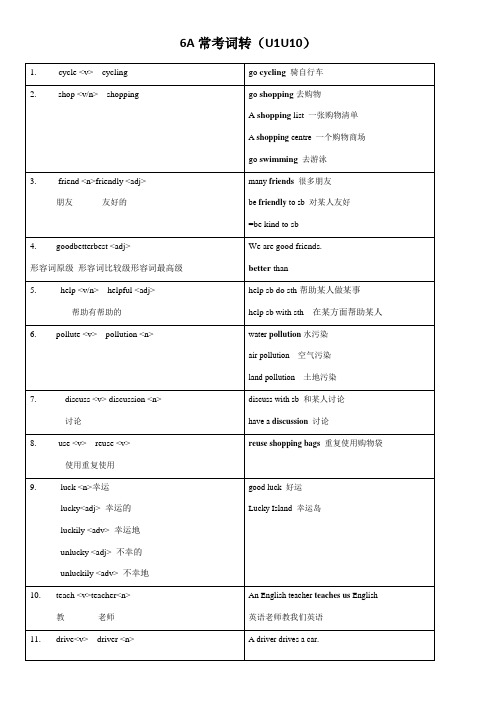
6A常考词转(U1U10)词义辨析1.hear意为“听见;听到”,指不是有意识地听,侧重于“听”的结果,不可以用在进行时态中。
如:What did you hear just now? 你刚才听见什么了?listen意为“听”,指有意识地听,但不一定能听见,侧重于“听”的动作,其后常接介词to,可以用在进行时态中。
如:Jack is listening to the teacher carefully in class. 杰克正在课堂上认真听讲。
2.in the morning 意为“在上午”,类似的还有in the afternoon和in the evening;但是表示在具体某一天的上午、下午和晚上时介词应用“on”。
如:My mother always goes shopping in the afternoon.My mother always goes shopping on Sunday afternoon.3.look for 指“寻找”某物(未必找到),强调动作;find 指“找到”某物,强调结果;find out表示“查明”,指通过努力去查明事情的真相等。
如:The teacher tries to find out who is not in the classroom.4.people (天生复数词)指“人群;人们”;而person 指“单个人;某一个人”。
因此,“一个人”可以说成a person,但不能说成a people。
如:Each person has his own characteristic (特征).Many people like playing basketball.5.work是不可数名词,意为“工作”;而job是可数名词,意为“职业”。
如:She does a lot of work every day, so she is always tired. 她每天都要做很多工作,所以她总是很累。
上海牛津英语6A期末复习(精华版)
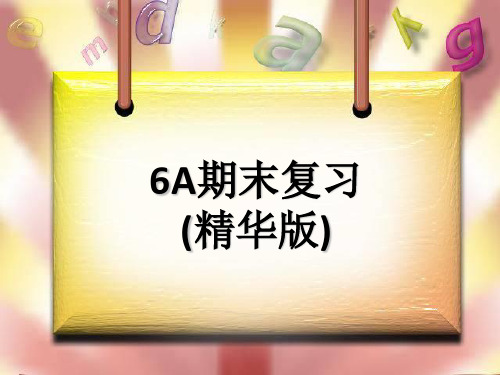
一般不用冠词的情况 1.What do you have for breakfast? (一日三餐
前) 2. We play football after school every
day. (球类运动前)
固定词组:by train/motorcycle, on foot, at night, at noon, watch TV, go to school, walk to school, be late for school, at weekends, start work, finish work, in class等。
6A期末复习 (精华版)
不定冠词(a/an)的用法
1.I would like to be a policeman. (职业前加“a” 或“an”) 2.There is a beautiful garden behind the house. (翻译成中文, 有“一”的意思) 3. 习惯用语:have a good/great time, half an hour, tell a lie, make a (shopping) list, have a picnic, have a barbecue, have a healthy diet, have an unhealthy diet, That’s a good idea. 等
(比较: day---days boy---boys) 2.可数名词的复数不规则变化 A.以o结尾 e.g. potato—potatoes tomato--tomatoes
(比较: radio---radios photo---photos piano---pianos kilo---kilos zoo---zoos kangaroo---kangaroos)
牛津英语沪教版6A 期末复习Unit1---11 词性转换(试题,无答案)
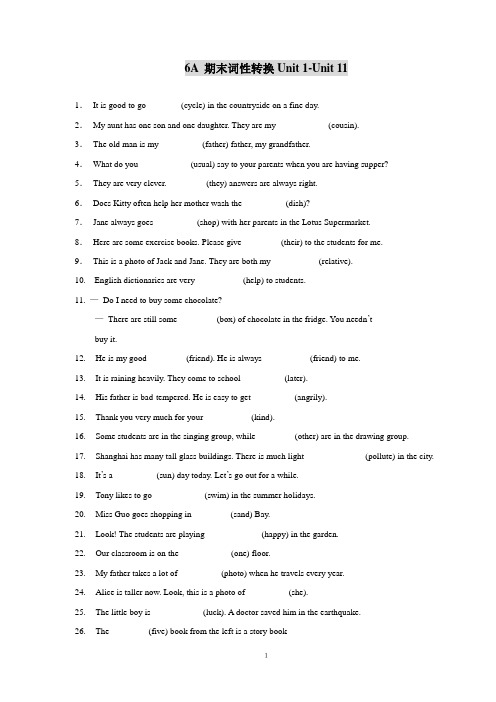
6A 期末词性转换Unit 1-Unit 111.It is good to go _______ (cycle) in the countryside on a fine day.2.My aunt has one son and one daughter. They are my ___________ (cousin).3.The old man is my _________ (father) father, my grandfather.4.What do you ___________ (usual) say to your parents when you are having supper?5.They are very clever. ________ (they) answers are always right.6.Does Kitty often help her mother wash the _________ (dish)?7.Jane always goes _________ (shop) with her parents in the Lotus Supermarket.8.Here are some exercise books. Please give ________ (their) to the students for me.9.This is a photo of Jack and Jane. They are both my __________ (relative).10. English dictionaries are very __________ (help) to students.11. —Do I need to buy some chocolate?—There are still some ________ (box) of chocolate in the fridge. You needn’tbuy it.12.He is my good ________ (friend). He is always __________ (friend) to me.13.It is raining heavily. They come to school _________ (later).14.His father is bad-tempered. He is easy to get _________ (angrily).15.Thank you very much for your __________ (kind).16.Some students are in the singing group, while ________ (other) are in the drawing group.17.Shanghai has many tall glass buildings. There is much light _____________ (pollute) in the city.18.It’s a _________ (sun) day today. Let’s go out for a while.19.Tony likes to go ___________ (swim) in the summer holidays.20.Miss Guo goes shopping in ________ (sand) Bay.21.Look! The students are playing ____________ (happy) in the garden.22.Our classroom is on the ___________ (one) floor.23.My father takes a lot of _________ (photo) when he travels every year.24.Alice is taller now. Look, this is a photo of _________ (she).25.The little boy is ___________ (luck). A doctor saved him in the earthquake.26.The ________ (five) book from the left is a story book27.Shanghai is more beautiful now. Many __________ (visit) come to visit it every year.28.There are many different ____________ (festival) in China.29.August 8th, 2008 was an ____________ (importance) day to the world.30.Grandma’s ___________ (sixty) birthday is coming soon.31.It is a ___________ (specially) day for the little boy.32.__________ (ride) bicycles s a good sport.33.___________ (lucky), the poor girl lost one of her legs in the terrible earthquake.34.The Lis are making _____________ (sandcastle) together at the beach.35.Don’t go out now. It’s a _________ (rain) day today.36.Mum gave Henry a toy car as a present on his __________ (four) birthday.37.You can’t drink __________ (pollute) water.38.The ___________ (secretary) are working hard in the office.39.Look at those ladies! They are _______________ (policewoman).40.I would like to be a ____________ (post) in the future.41.My aunt works as a shop ___________ (assist) in the supermarket.42.Jane’s mother ____________ (teach) English at school. She is an English ___________ (teach).43.My aunt is a __________ (cook). He _________ (cook) food for people.44. A lot of ___________ (child) lost their lives in the earthquake.45.Doctors are lovely people because they make sick people ____________ (good).46.Adults must put some medicine in a ____________ (safely) place.47.Shanghai and Beijing are famous __________ (city) in the world.48.Liu Xiang is a good ___________ (run). He can run fast.49.Students must have different kinds of _____________ (activity) at school.50.Look, those ___________ (fish) have caught a lot of fish.51.Children should remember, “___________ (safe) is the most important thing.”52.People have ____________ (difference) activities in summer.53.The headmaster will wait at the _____________ (enter).54.We are having the __________ (finally) exam.55.Would you like ______________ (see) a film with me?56.____________ (final), Ben won the Olympic Maths Contest.57.Simon always ___________ (finish) his homework before dinner.58.Maggie always goes to school ____________ (with) breakfast. It’s bad for her health.59.I like to make ___________ (sickness) people better.60.There will be a lot of _____________ (people) in our school this term.61.We can ___________ (use) shopping bags to look after the environment.62.l can see a few _______(factory) when l am on the way to school.63.There is a big _______(swim) pool in our neighbourhood.64.There is a large area of _______(house) estates in front of the park.65.This is the ________(one) time that my father has been to Japan.66.______(final), we visited the Great Wall and took many photos there.67.We are not children any more, and we can do these by ________(we)68.Peter usually has tea and cakes on the _________(five) floor with Mary.69.One of Joy’s _______(foot) was hurt in the accident.70.I’m free this Sunday. Let’s do some _______(shop) in the market.71.My mother often buy the things which are cheap and ________(use).72.Factory ______(work) make a lot of things.73.We can __________(entrance) the hall through the door over there.74.April is the _______(four) mouth of the year.75.Let me tell something about ______(I)76.Wendy is writing some __________(invite) to her relatives.77.Kitty likes eating ________(steam) prawns with garlic.78.I had a ______(fry) egg and a glass of milk this morning.79.The dish of _______(boil) beef and carrot tastes good.80.The ______(bake) potatoes made by my mother are very delicious.81.If you want to buy ice-cream, you should go to the_________(freeze) food section.82.Some people in Sishuan like eating _______(chilli)83.The dishes are really too ________(spice). I don’t like them.84.How _____(taste) these oranges are !85.Playing computer games is great _______(funny)86.December is the ________(twelve) month of a year.87.Jenny likes animals very much. She ___________(want)to go to the zoo tomorrow.88.Would you like __________(see)a film with me.89.My mother _________(teach)Chinese for more than twenty years.90.Who’s _________(take)my sports shoes away by mistake?91.It dangerous _________(chase) each other in the corridor.92.After three weeks’ holiday,I put on more __________ (weigh).93.I can’t tell whose ___________(sign)it is on the paper.94.Lily and I __________(fly)kites this Friday.95.Who is the _________ (write)of this book?96.My watch looks like __________ (you).97.This dictionary is very_________to me. (help)98.The boy is always_________with his homework and does well. (care)99.We are _______to visit place in America. (plan)100.My little brother’s ________birthday is coming.(nine)101.My father often goes________ in the river.(fish)102.Many _________(visit)come to Shanghai every year.103.I _________(not finish)my homework yet.104.She has__________(draw)a plan of Rose Garden School on the board.105.Simon always ___________ (finish)his homework before dinner.106.The soup is really too________. (salt)107.How_________ these oranges are!(taste)108.Yesterday he_______ some steamed fish for lunch.(eat)。
(完整版)牛津英语上海版6BU3复习资料(词组、词形转换、要点、补充练习).doc
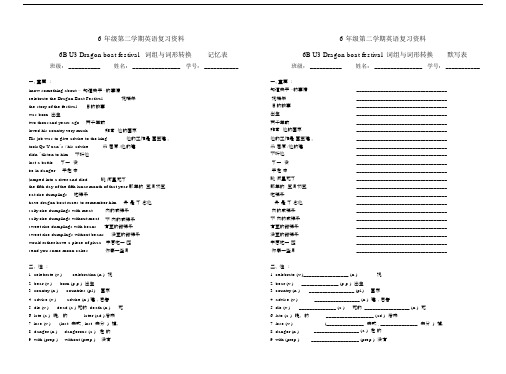
6年级第二学期英语复习资料6B U3 Dragon boat festival 词组与词形转换记忆表班级: __________ 姓名: _______________ 学号: ___________一、重要:know something about ⋯知道关于⋯的事情celebrate the Dragon Boat Festival 祝端午the story of the festival 日的故事was born 出生two thousand years ago 两千年前loved his country very much 非常他的国家His job was to give advice to the king 他的工作是国王建。
took Qu Y uan’s / his advice 采屈原 /他的建didn ’tlisten to him 不听他lost a battle 了一役be in danger 于危中jumped into a river and died 跳河里死了the fifth day of the fifth lunar month of that year那年的五月初五eat rice dumplings 吃粽子have dragon boat races to remember him 舟是了念他salty rice dumplings with meat 肉的咸粽子salty rice dumplings without meat 不肉的咸粽子sweet rice dumplings with beans 有豆的甜粽子sweet rice dumplings without beans 没豆的甜粽子would rather have a piece of pizza 宁愿吃一匹send you some moon cakes 你寄一些月二、性:1. celebrate (v.) celebration (n.) 祝2. bear (v.) born (p.p.) 出生3. country (n.) countries (pl.) 国家4. advise (v.) advice (n.) 建,忠告5. die (v.) dead (a.) 死的 death (n.) 死6. late (a.) 晚,的later (ad.) 后来7. lose (v.) (lost 去式 , lost 去分 ) 掉,8. danger (n.) dangerous (a.) 危的9. with (prep.) without (prep.) 没有6年级第二学期英语复习资料6B U3 Dragon boat festival 词组与词形转换默写表班级: __________ 姓名: _______________ 学号: ___________一、重要:知道关于⋯的事情__________________________________祝端午__________________________________日的故事__________________________________出生__________________________________两千年前__________________________________非常他的国家__________________________________他的工作是国王建。
牛津英语6A语法总结
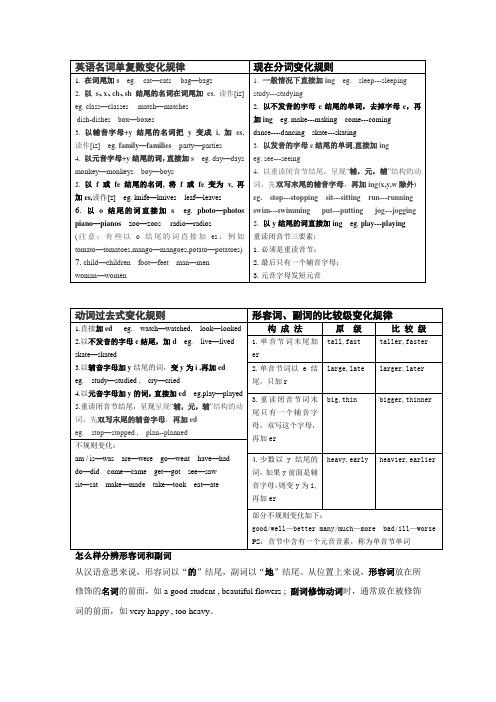
怎么样分辨形容词和副词从汉语意思来说,形容词以“的”结尾,副词以“地”结尾。
从位置上来说,形容词放在所修饰的名词的前面,如a good student , beautiful flowers ; 副词修饰动词时,通常放在被修饰词的前面,如very happy , too heavy。
形容词比较级的基本句式1.表示“甲比乙更……”的句式为:“甲+be+比较级+than+乙”。
例如:This ruler is longer than that one.这把尺子比那把长。
2.表示“甲比乙多多少”的句式为:“甲+be+数量+比较级+than+乙”。
例如:I am three years older than him.我比他大三岁。
3.表示“谁/ 哪一个比另一个更……”的句式为:“疑问词+be+比较级+than+乙?”例如:Who is stronger than David?谁比大卫强壮?4.表示“谁的人/东西更……”的句式为:“Whose+人/ 物+be+比较级,甲or乙?”例如:Whose cat is fatter , yours or mine?谁的猫更胖,你的还是我的?副词比较级的基本句式1.表示“甲比乙做得更……”的句式为:“甲+动词+比较级+than+乙”。
例如:Liu Tao jumps farther than Gao Shan.2.表示“谁比某人做得更……”的句式为:Who+动词+比较级+than+乙?”例如:Who skates better than Helen?谁溜冰比海伦好?形容词比较级的基本句式1.表示“甲比乙更……”的句式为:“甲+be+比较级+than+乙”。
例如:This ruler is longer than that one.这把尺子比那把长。
2.表示“甲比乙多多少”的句式为:“甲+be+数量+比较级+than+乙”。
例如:I am three years older than him.我比他大三岁。
牛津英语上海版6BU3复习资料(词组、词形转换、要点、补充练习)
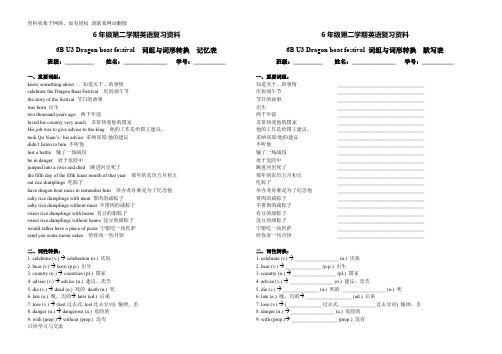
6年级第二学期英语复习资料6B U3 Dragon boat festival 词组与词形转换记忆表班级:__________ 姓名:_______________ 学号:___________一、重要词组:know something about …知道关于…的事情celebrate the Dragon Boat Festival 庆祝端午节the story of the festival 节日的故事was born 出生two thousand years ago 两千年前loved his country very much 非常热爱他的国家His job was to give advice to the king 他的工作是给国王建议。
took Qu Y uan’s / his advice 采纳屈原/他的建议didn’t listen to him 不听他lost a battle 输了一场战役be in danger 处于危险中jumped into a river and died 跳进河里死了the fifth day of the fifth lunar month of that year 那年的农历五月初五eat rice dumplings 吃粽子have dragon boat races to remember him 举办龙舟赛是为了纪念他salty rice dumplings with meat 带肉的咸粽子salty rice dumplings without meat 不带肉的咸粽子sweet rice dumplings with beans 有豆的甜粽子sweet rice dumplings without beans 没豆的甜粽子would rather have a piece of pizza 宁愿吃一块匹萨send you some moon cakes 给你寄一些月饼二、词性转换:1. celebrate (v.) → celebration (n.) 庆祝2. bear (v.) → born (p.p.) 出生3. country (n.) → countries (pl.) 国家4. advise (v.) → advice (n.) 建议,忠告5. die (v.) → dead (a.) 死的death (n.) 死6. late (a.) 晚,迟的→ later (ad.) 后来7. lose (v.) → (lost过去式, lost过去分词) 输掉,丢8. danger (n.) → dangerous (a.) 危险的9. with (prep.)→ without (prep.) 没有6年级第二学期英语复习资料6B U3 Dragon boat festival 词组与词形转换默写表班级:__________ 姓名:_______________ 学号:___________一、重要词组:知道关于…的事情__________________________________庆祝端午节__________________________________节日的故事__________________________________出生__________________________________两千年前__________________________________非常热爱他的国家__________________________________他的工作是给国王建议。
打印2牛津英语上海版6A词汇变形汇总复习

预备年级上学期英语期末复习专项2 Complete the sentences with the given words in their proper forms. Exercise based on our books(课内练习)1.____English teacher has a lovely son .(We)2.Would you like to go to the restaurant with _____?(we )3.How many _____are there in your family ?(people )4.I often help my mother wash the ________.(dish)5.There are two ______in Mr Li’s family . (child)6.Betty _____goes to the park with her grandmother . (usual )7.My parents and I often go ______at weekends . It’s good for us . (cycle )8.Our teachers are always _______.(friend)9.My grandfather is a _______man with a warm heart (help)10.My grandparents like my brother and ______(I)11.His father will visit the USA for the _______time ( one )12.Books help ______a lot in many ways . (we)13.We should never tell ______.(lie )14.Many people are ______our earth . Let’s try to stop them .(pollution )15.Jim works in one of the new ________.(factory)16.I usually go ______with my Mum on Sundays . (shop)17.We have a lot of ______after school .(activity)18.How about ______games after school ?(play)19.They have the dog as one of the family ______.(member)20.There is a ______pool in our housing estate .(swim)21.What do you _____do on Sundays ?(usual)22.Mary sometimes goes to the park with her ______dog .(love)23..His aunt is a shop _____ in that department store .(assist )24.My father takes me to school and then______to work .(driver)25.The doctor looks after people’s ______(tooth)26.My uncle is a _______(drive)27.Sue and Mary are ______in the office . (secretary )28.The classroom ______in our school are high and bright .(build )29.Tommy’s father often makes the sick people _______(well)30.Americans ,like Chinese , call the ground floor the _______floor (one)31.She has sent several_______to her friends .(invite)32.______parents are pleased with the Open Day .(they )33.Six students will wait for the parents at the ______.(enter)34.What will they do ______?(final)35.We are _____the programme for the Open Day now .(plan )36.We will have a ________after class (discuss)37.There are many _____on the Huangpu river .(ferry )38.______to many places is very interesting .(Travel)39.Have you been to any ______in Zhejiang ?(temple)40.My ____estate is near my school .(house)41.I can see a lot of shops when I am _____to school .(walk)42.Cherry doesn’t like to be a cook because she doesn’t like _____(cook)43.My father has been to many _____places .(difference)44.We are going to celebrate Grandma’s ______(eighty) birthday together .45.There are a lot of ________(library ) in our city .46.What are your favourite ______? (activity)47.Don’t run _____the street! (cross)48.I’ll meet you at the _______of the cinema .(enter)49.You must walk into the room _______(quiet)50.Most young people can use computers_______.(good)51.What’s the ______of this word ?(mean)52.Can you see these signs ______?(clear )53.It’s too _____in the classroom .(noise )54.We must not sing _______at night (loud)55.The underground can go ______(quick)56.Would you like apples or _______?(orange)57._____potatoes taste nice .(bake)58.Put the _____food into a fridge .(freeze)59.Before _____, we’d like to make a list .(shop)60.She’s just _____some fresh watermelon .(buy)61.Most children like ______because they taste nice .(strawberry)62.Would you like some _____eggs ?(fry)63.I’d like _____prawns with garlic , what about you ?(steam)64.My grandma usually eats a ______ egg for breakfast .(boil )65.There are a lot of ______(beach) in Australia (澳大利亚)66.You’ve put too much salt . The food is ______.(salt)67._____like barbecue very much .(child)68.It’s_____here .Let’s change a place .(wind)69.Germans like _____and beer .(potato)70.How_____the story is !(fun)71.The barbecued meat is _______.(taste)72.I love barbecues ! They are a lot of ______!(funny )73.These _______(chilli) are too spicy .74.He eats too much fat and sugar . His diet is _____.(healthy)75.She eats less and exercise more . She is ______than before .(thin)76.You must brush your _____two times every day . (tooth)77.You must change your bad _____habit .(eat)st month he _____with his cousin in Beijing (stay)79.Everyone likes _____books (fun)80.My father looks _____than my uncle .(young )81.I like sweets _____That’s my favourite food .(well )82.Many children like summer and autumn . But I like spring _____(well)83.Kitty’s apple is bigger than _______(me)84.Shanghai is much _________(beautiful ) now .85.We are going to use ________(few) plastic (塑料) bags and make _____(little )rubbish on the beach .86.My apple looks_____(big) than _____(you)87.Too _____ soft drinks are bad for you . (more)88.Too ______ fried food is bad for you .( more)89.This shirt is too big , please give me a ______(small) one .90.The girls like _______(be) thin .91.My mother likes to watch a programme about ______.(cook )92.This paste is made from ____and some other ingrediants .(tomato)93.He _____bought some bread and then bought some fruit jam .(one)94.Look ! There are fout small _____of tomato sauce here .(tin)95.In fact , hamburgers are ______food (health)96._______(two), put some tomato paste o the bread .97.Fruit and vegetables are good for our _______(healthy)98.Lily has ______(much) Coke than I do .99.The doctor gave him some _______(suggest).Extra exercises(补充练习)1.Edison ______________ (invent) electric lights.2.Mary made a paper plane _____________ (she).3.Jack looks much ______________ (health) than before.4.She lives on the ________________ (two) floor.5.The twins aren’t English. They are ______________ (Germany).6.Have you finished _____________ (write) the letter to Jane?7.Tom Cruise, a famous American ___________, made a film in Shanghai a fewmonths ago. (act)8.Thank you very much for your _______________. (kind)9.We have seen this film _____________. (two)10.It is ______________ for him to finish so much work in half an hour. (usual)11.An English-Chinese dictionary is our good ______________. (help)12.This morning I received an ______________ from Miss Li. (invite)13.It snowed ______________ last night. (heavy)14.The ______________ letters are written in English. (busy)15.I do even ____________ in English than before. (bad)16.He looked _____________ at the broken glass. (sad)17.You aren’t ____________ enough.You should take exercise every day.(health)18.Today is Emma’s _______________ birthday. (fifteen)19.I saw the baby ____________ in bed quietly just now. (lie)20.Of the three films, this one is the most ____________. (excite)21.The English speak English. So do the ___________. (America)22.Make ___________ at home, children. (you)23.He works hardest, but gets the ___________ money of all. (little)24.The boy looked ___________ when he knew he got a “D” for English. (happy)25.Is the news __________ true? (real)26.May is the ______________ month of a year. (five)27.She is a real ____________. (cook)28.Let’s go round to see __________ this afternoon. (she)29.She is the ___________ one of them all. (pretty)30.he old lady looked __________ at the map. (care)31.He could walk as ____________ (quick) as you.32.Jack missed the early bus, so he felt ____________ (happy).33.Please read the whole text ____________ (one) more.34.Such cold weather is quite _____________ (usual) in May.35.Don’t be afraid. You’d better tell __________(we) his name.36.Just now I saw a car stopping ____________(quick) in front of Mary.37.Chaplin was one of the _____________(great) actors in the world.38.Mary became famous in her _____________(twenty).39.________, the students went back on the school bus. (final)40.I’d like vegetables and some _________ chicken wings for dinner. ( fry)41.Do you brush your________ before you go to bed? ( tooth)42.Do you think that is a bad________ habit? ( eat)43.The old man______(be)ill for a long time and he________(stay) in bed for aweek. His son________(decide) to send him to the hospital yesterday.44.I_______(write) to you last week. _______you________(receive) the letteryet?45.“_______the train_______(arrive) yet?” “Yes, and it_________(already leave).“ “What?! When _______it________(leave)?” “Half an hour ago!”46.Something unusual ____ (happen) to you if you ____ (not be) careful.47.How long ______ your uncle______ (live) in Beijing?48.______ you______(see) Tom? Yes, I have. Where _______you________ (see)him? I______ (see) him reading a novel in the library.。
上海牛津英语6A单词短语
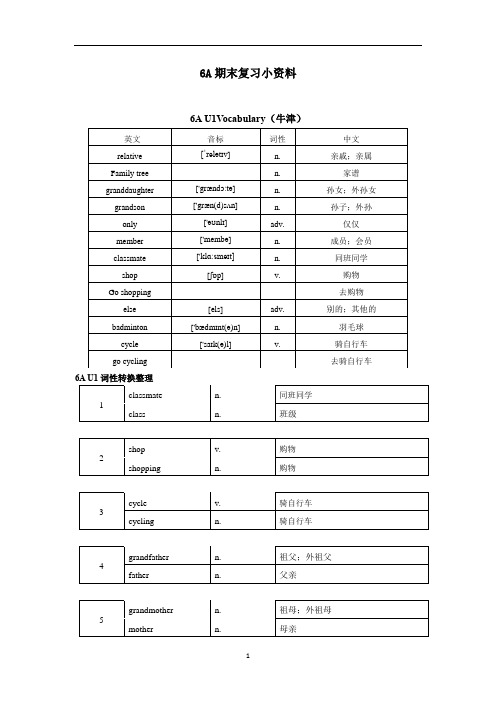
6A期末复习小资料6A U1Vocabulary(牛津)(2)6A U1重难点6A U2Vocabulary(牛津)2)6A U1重难点1. 词组like to do词组like to do解释为“喜欢干…”,接近于like doing。
I like to fish. = I like fishing. (我喜欢钓鱼。
这里的fish作动词。
)2. 词组promise to do sth. / promise not to do sth.词组promise to do sth.解释为“承诺、保证干某事”。
promise not to do sth. 解释为“保证不做某事”。
3. 词组share sth. with sb.词组share sth. with sb. 解释为“与某人一起分享某物”。
4. 词组look after词组look after解释为“照顾、照看…”,相当于take care of。
5. just和already的用法just 和already都用于现在完成时。
just解释为“刚刚”,而already解释为“已经”。
just所描述的动作发生的时间离现在近,而already所描述的动作发生的时间离现在远。
6. be late for 迟于做…7. 词组work hardwork hard解释为努力工作、学习,勤奋于工作、学习,其中hard在这里作为副词,表示勤奋地、努力地。
8. pollute v. 污染pollution n. 污染9.(not)at all(用于否定句)一点也(不)/完全(不)10.(be)kind to对…….友好11. always, never是副词12. get angry生气get是,意为使,处于。
be angry强调。
13. tell lies (a lie)撒谎6A U3Vocabulary(牛津)(2)6A U3重难点6A U4Vocabulary(牛津)(2)6A U5重难点1. entrance n. 入口【联想】enter v. 进入enter some place = go/walk/come into some place 进入某地2. noticeboard n. 信息板3. plan1) v. 计划plan to do sth. 计划做某事plan sth. 计划某事2) n. 计划4. programme n. 计划,安排a programme for... ……的计划,……的安排5. arrive in, arrive at, get to和reach四者都可以表示“到达”;arrive 后接“较大的地方”,arrive 后接“较小的地方”,get to和reach后直接加宾语。
牛津英语上海版6A词汇变形汇总复习
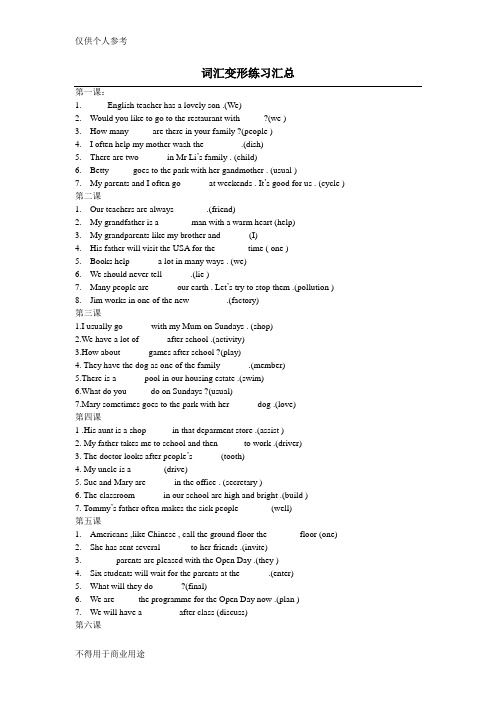
词汇变形练习汇总第一课:1.____English teacher has a lovely son .(We)2.Would you like to go to the restaurant with _____?(we )3.How many _____are there in your family ?(people )4.I often help my mother wash the ________.(dish)5.There are two ______in Mr Li’s family . (child)6.Betty _____goes to the park with her gandmother . (usual )7.My parents and I often go ______at weekends . It’s good for us . (cycle ) 第二课1.Our teachers are always _______.(friend)2.My grandfather is a _______man with a warm heart (help)3.My grandparents like my brother and ______(I)4.His father will visit the USA for the _______time ( one )5.Books help ______a lot in many ways . (we)6.We should never tell ______.(lie )7.Many people are ______our earth . Let’s try to stop them .(pollution )8.Jim works in one of the new ________.(factory)第三课1.I usually go ______with my Mum on Sundays . (shop)2.We have a lot of ______after school .(activity)3.How about ______games after school ?(play)4. They have the dog as one of the family ______.(member)5.There is a ______pool in our housing estate .(swim)6.What do you _____do on Sundays ?(usual)7.Mary sometimes goes to the park with her ______dog .(love)第四课1 .His aunt is a shop _____ in that deparment store .(assist )2. My father takes me to school and then______to work .(driver)3. The doctor looks after people’s ______(tooth)4. My uncle is a _______(drive)5. Sue and Mary are ______in the office . (secretary )6. The classroom ______in our school are high and bright .(build )7. Tommy’s father often makes the sick people _______(well)第五课1.Americans ,like Chinese , call the ground floor the _______floor (one)2.She has sent several_______to her friends .(invite)3.______parents are pleased with the Open Day .(they )4.Six students will wait for the parents at the ______.(enter)5.What will they do ______?(final)6.We are _____the programme for the Open Day now .(plan )7.We will have a ________after class (discuss)第六课1.There are many _____on the Huangpu river .(ferry )2.______to many places is very interesting .(Travel)3.Have you been to any ______in Zhejiang ?(temple)4.My ____estate is near my school .(house)5.I can see a lot of shops when I am _____to school .(walk)6.Cherry doesn’t like to be a cook because she doesn’t like _____(cook)7.My father has been to many _____places .(difference)8.We are going to celebrate Grandma’s ______(eighty) birthday together .9.There are a lot of ________(library ) in our city .第七课1.What are your favourite ______? (activity)2.Don’t run _____the street! (cross)3.I’ll meet you at the _______of the cinema .(enter)4.You must walk into the room _______(quiet)5.Most young people can use computers_______.(good)6.What’s the ______of this word ?(mean)7.Can you see these signs ______?(clear )8.It’s too _____in the classroom .(noise )9.We must not sing _______at night (loud)10.The underground can go ______(quick)第八课1.Would you like apples or _______?(orange)2._____potatoes taste nice .(bake)3.Put the _____food into a fridge .(freeze)4.Before _____, we’d like to make a list .(shop)5.She’s just _____some fresh watermelon .(buy)6.Most children like ______because they taste nice .(strawberry)7.Would you like some _____eggs ?(fry)8.I’d like _____prawns with garlic , what about you ?(steam)9.My grandma usually eats a ______ egg for breakfast .(boil )10.There are a lot of ______(beach) in Australia (澳大利亚)第九课1.You’ve put too much salt . The food is ______.(salt)2._____like barbecue very much .(child)3.It’s_____here .Let’s change a place .(wind)4..Germans like _____and beer .(potato)5..How_____the story is !(fun)6..The barbecued meat is _______.(taste)7. I love barbecues ! They are a lot of ______!(funny )8. These _______(chilli) are too spicy .第十课1.He eats too much fat and sugar . His diet is _____.(healthy)2.She eats less and exercise more . She is ______than before .(thin)3.You must brush your _____two times every day . (tooth)4.You must change your bad _____habit .(eat)st month he _____with his cousin in Beijing (stay)6.Everyone likes _____books (fun)7.My father looks _____than my uncle .(young )8.I like sweets _____That’s my favourite food .(well )9.Many children like summer and autumn . But I like spring _____(well)10.Kitty’s apple is bigger than _______(me)11.Shanghai is much _________(beautiful ) now .12.We are going to use ________(few) plastic (塑料) bags and make _____(little ) rubbish on thebeach .13.My apple looks_____(big) than _____(you)14.Too _____ soft drinks are bad for you . (more)15.Too ______ fried food is bad for you .( more)16.This shirt is too big , please give me a ______(small) one .17.The girls like _______(be) thin .第十一课1.My mother likes to watch a programme about ______.(cook )2.This paste is made from ____and some other ingrediants .(tomato)3.He _____bought some bread and then bought some fruit jam .(one)4.Look ! There are fout small _____of tomato sauce here .(tin)5.In fact , hamburgers are ______food (health)6._______(two), put some tomato paste o the bread .7.Fruit and vegetables are good for our _______(healthy)8.Lily has ______(much) Coke than I do .9. The doctor gave him some _______(suggest).仅供个人用于学习、研究;不得用于商业用途。
6A词性转换单项复习(1T)
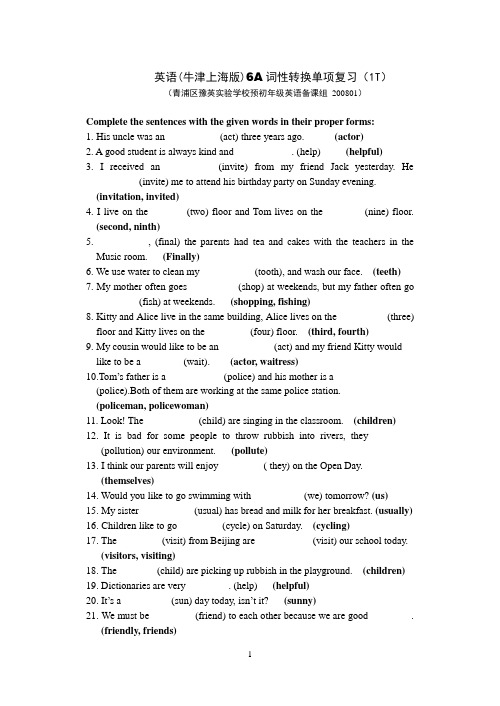
英语(牛津上海版)6A词性转换单项复习(1T)(青浦区豫英实验学校预初年级英语备课组200801)Complete the sentences with the given words in their proper forms:1. His uncle was an __________ (act) three years ago. (actor)2. A good student is always kind and ___________. (help) (helpful)3. I received an _________ (invite) from my friend Jack yesterday. He ________ (invite) me to attend his birthday party on Sunday evening. (invitation, invited)4. I live on the_______ (two) floor and Tom lives on the _______ (nine) floor. (second, ninth)5. __________, (final) the parents had tea and cakes with the teachers in the Music room. (Finally)6. We use water to clean my __________ (tooth), and wash our face. (teeth)7. My mother often goes _________ (shop) at weekends, but my father often go ________ (fish) at weekends. (shopping, fishing)8. Kitty and Alice live in the same building, Alice lives on the _________ (three) floor and Kitty lives on the ________ (four) floor. (third, fourth)9. My cousin would like to be an __________ (act) and my friend Kitty would like to be a________ (wait). (actor, waitress)10.Tom’s father is a___________ (police) and his mother is a __________ (police).Both of them are working at the same police station. (policeman, policewoman)11. Look! The __________ (child) are singing in the classroom. (children)12. It is bad for some people to throw rubbish into rivers, they ________(pollution) our environment. (pollute)13. I think our parents will enjoy ________ ( they) on the Open Day.(themselves)14. Would you like to go swimming with__________ (we) tomorrow? (us)15. My sister __________ (usual) has bread and milk for her breakfast. (usually)16. Children like to go ________ (cycle) on Saturday. (cycling)17. The ________ (visit) from Beijing are _________ (visit) our school today.(visitors, visiting)18. The _______ (child) are picking up rubbish in the playground. (children)19. Dictionaries are very ________. (help) (helpful)20. It’s a _________ (sun) day today, isn’t it? (sunny)21. We must be ________ (friend) to each other because we are good ________.(friendly, friends)22. Judy is a _______ (wait) and John is a _________. (drive) (waitress, driver)23. My uncle works very hard and now he is a __________. (science) (scientist)24 The headmaster will meet our parents at the __________. ( enter ) (entrance)25.Kitty will write an __________ to her parents. She will __________ herparents to their Open Day. ( invite ) (invitation, invite)26.They had tea and cakes with many __________ (teach) in the music room.(teachers)27.My elder sister is two years __________ (old) than I. (older)28.John wants to be a doctor because he likes to make sick people_________.(well) (better)29.Jack wants to be a __________.He likes __________ a bus. (drive) (driver, driving)30. --How about __________ Garden City? (visit)-- That’s a good idea.(visiting)31.She is always kind to __________. She always help _________ people. (other)(others, other)32. As students, we should be __________ (friend) and ________ (help) toothers. (friendly, helpful)33.We shouldn’t leave shopping bag s. We should _________ them. (use) (reuse)34. ___________ is a big problem(问题). We mustn’t _______ our environment. (pollute) (Pollution, pollute)35. Kitty is a very good student. She always ________ (work) very hard.(works)36. We’re __________ granddaughter s. We love __________. (they)(their, them)37. I usually play badminton with __________. (she) (her)38. What else do you often do with ___________? (he) (him)39. If words have the same __________ (one) letter, the _________ (two) letterdecides the alphabetical order. (first, second)40. There are two big __________ ( library ) in our school. (libraries)41. Mr.Wang is in poor_________ because he has an ________ diet. (health)(health, unhealthy)42.Mr. Lin never does exercise and likes to eat pizza and fried food. So he musthave a _________(health) diet now. (healthy)。
牛津上海版英语六年级第二学期 Unit6 Seasonal changes知识点精讲及巩固练习
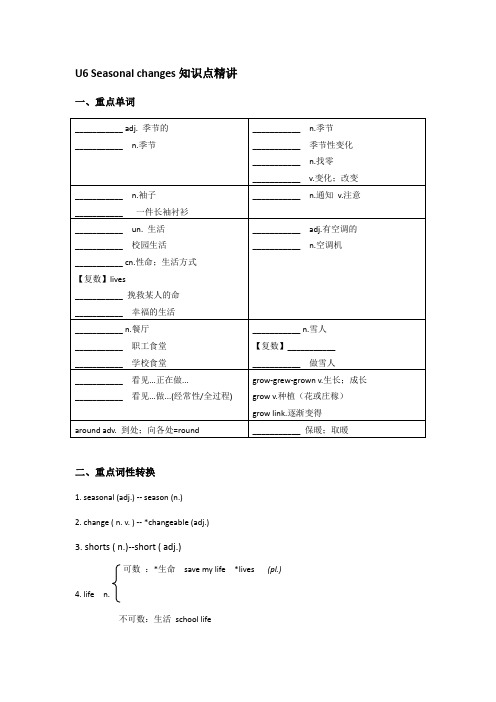
U6 Seasonal changes知识点精讲一、重点单词二、重点词性转换1. seasonal (adj.) -- season (n.)2. change ( n. v. ) -- *changeable (adj.)3. shorts ( n.)--short ( adj.)可数:*生命save my life *lives (pl.)4. life n.不可数:生活school lifelive (v.)*living adj. (定语) *alive adj. (表语)The farmer and his wife live happily in their hut and they enjoy their happy life very much.The hero who has saved his life is still alive.5. air-conditioned (adj.)air-conditioner (n.)三、重点短语1.uniforms for different seasons不同季节的校服2.write a notice about sth. to sb.给某人写一份关于…的通知= write sb. a notice about sth.3.in spring/summer/autumn/winter在春/夏/秋/冬4.wear summer/winter uniforms穿夏季/冬季校服5. a uniform一套校服6.in January在一月*February/March/April/May/June/July/August/September/October/November/December7.in early April在四月初8.in late October在十月末9.shirts with the short/long sleeves短袖/长袖衬衫10.dresses with the short/long sleeves短袖/长袖连衣裙11.wear a red scarf / red scarves 戴红领巾12. a pair of socks/shoes 一双袜子/鞋子* a pair of glasses, a pair of trousers (is)13.take some photographs of the school life拍一些有关于学校生活的照片14.in the school garden/playground/ library/canteen 在学校花园/操场/图书馆/食堂15.fly around到处飞舞16.study in the air-conditioned library在有空调的图书馆学习*= study in the library with air-conditioners17.have ice-cream and soft drinks吃冷饮喝软饮料18.before / after breakfast/ lunch/dinner在早餐/午餐/晚餐之前/后19.not many flowers没有很多的花20.Leaves are on the trees.树叶在树上*Birds are in the trees.鸟儿在树上21.help students (to) keep warm帮助学生保暖* help sb (to) do sth帮助某人做某事*help sb with sth22.keep warm/clean/quiet保持温暖/干净/安静23.make snowmen (a snowman)堆雪人四、重点句型1. Miss Guo is writing a notice to all new students about their uniforms in summer.【知识链接】此句为现在进行时态。
(完整版)牛津英语上海版6BU5复习资料(词组、词形转换、要点、补充练习).doc
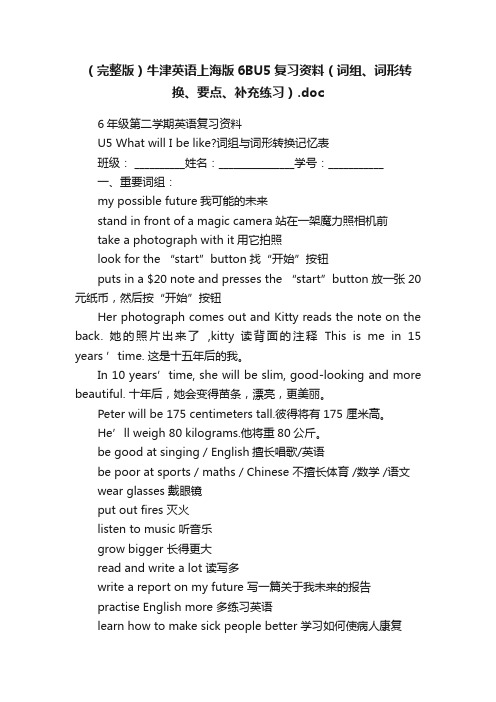
(完整版)牛津英语上海版6BU5复习资料(词组、词形转换、要点、补充练习).doc6年级第二学期英语复习资料U5 What will I be like?词组与词形转换记忆表班级: __________姓名:_______________学号:___________一、重要词组:my possible future我可能的未来stand in front of a magic camera站在一架魔力照相机前take a photograph with it用它拍照look for the “start”button找“开始”按钮puts in a $20 note and presses the “start”button放一张20元纸币,然后按“开始”按钮Her photograph comes out and Kitty reads the note on the back. 她的照片出来了,kitty 读背面的注释This is me in 15 years ’time. 这是十五年后的我。
In 10 years’time, she will be slim, good-looking and more beautiful. 十年后,她会变得苗条,漂亮,更美丽。
Peter will be 175 centimeters tall.彼得将有175 厘米高。
He’ll weigh 80 kilograms.他将重80公斤。
be good at singing / English擅长唱歌/英语be poor at sports / maths / Chinese 不擅长体育 /数学 /语文wear glasses 戴眼镜put out fires 灭火listen to music 听音乐grow bigger 长得更大read and write a lot 读写多write a report on my future 写一篇关于我未来的报告practise English more 多练习英语learn how to make sick people better 学习如何使病人康复What would you like to be? 你想成为什么?I will be an astronaut. 我想成为一名宇航员。
上海牛津版英语六年级第一学期6A期末复习知识点总结
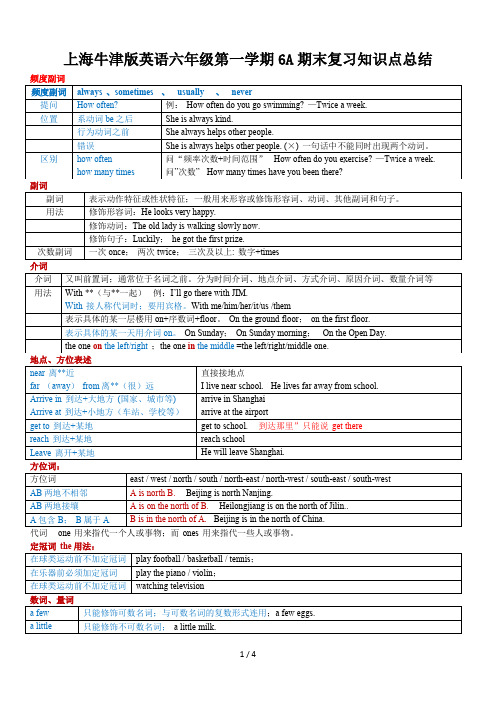
构成:have/has +动词的过去分词
(1)表示动作发生在过去;对现在有影响。I have read this book three times.
(2)表示从过去某一时间开始到现在一直在做某事。I have been in CHINA for three years.
用法
have/has been to 去过/到过 (现在已经回来) have/has gone to 去/到(表示现在还没有回来)
表示具体的某一层楼用on+序数词+floor。 On the ground floor; on the first floor.
表示具体的某一天用介词on。On Sunday; On Sunday morning; On the Open Day.
the oneonthe left/right;the oneinthe middle=the left/right/middle one.
a quarter of 四分之一 three quarters of 四分之三
交通工具
by bus/bike/car/underground/train/ferryHe goes to school by bus.
take a bus/car/underground/train/ferryHe takes a bus to school.
代词 one 用来指代一个人或事物;而 ones 用来指代一些人或事物。
定冠词 the用法:
在球类运动前不加定冠词
play football / basketball / tennis;
在乐器前必须加定冠词
play the piano / violin;
上海牛津英语六年级上学期词性转换期末复习11

Oxford 6A 词性转换1.shop n. 商店shop v. 购物2.other adj. 其他的others pron. 其他的人或物3.friend n. 朋友friendly adj. 友好的4.help v. 帮助helpful adj. 有帮助的5.pollute v. 污染pollution n. 污染6.discuss v. 讨论discussion n. 讨论e v 使用reuse v. 再利用8.promise v. 承诺;保证promise n. 诺言9.lie n. 谎言lie v. 躺10.w rite v. 写writer n. 作者11.v isit v. 拜访;参观visit n. 拜访;参观12.luck n. 运气lucky adj.幸运的luckily adv.13.plan v. 计划plan n. 计划;平面图14.cost v. 花费cost n. 花费15.s wim v. 游泳ual adj. 通常的usually adv. 通常17.teach v. 教teacher n. 教师18.drive v. 驾车driver n. 司机19.fire n. 火fireman n. 消防队员20.p ost v. 邮寄postman n. 邮递员21.c ook v. 烹饪cook n. 厨师cooker n. 炊具22.w ork v. 工作work n. 工作worker n. 工人23.e nter v. 进入entrance n. 入口处24.f inal adj. 最后的finally adv. 最后25.i nvite v. 邀请invitation n. 请柬26.m eet v. 遇见meeting n. 会议27.l oud adj. 大声的loudly adv. 大声地28.m ean v. 表示……的意思meaning n. 意义29.c ross v. 横穿across prep. 穿过;在对swimmer n. 游泳者30.steam v. 蒸steamed adj.31.fry v. 炒,煎,炸fried adj.32.boil v. 煮boiled adj.33.bake v. 烤baked adj.34.freeze v. 结冰;冷冻frozen adj. 冰冻的35.favourite n. 最喜欢的人或物favourite adj. 最喜欢的36.fun n. 有趣的事funny adj. 有趣的;滑稽的37.spice n. 香料spicy adj. 辛辣的38.salt n. 盐salty adj. 咸的39.taste v. 品尝tasty adj. 美味的40.drink v. 喝drink n. 饮料41.sweet adj. 甜的sweets n. 糖果42.health n. 健康healthy adj. 健康的unhealthy adj. 不健康的43.eat v. 吃eating n. 饮食面45.score n. 分数score v. 计分46--shoppingswim--swimmingput—puttingplan—planningget—gettingtravel—travellingcycle—cyclingleave—leavingpollute—pollutingprepare—preparingcompare—comparing 47.one—firsttwo—secondthree—thirdfour—fourthfive—fifthsix—sixthseven—seventheight—eighthnine—ninthten-tentheleven—eleventhtwelve—twelfthfourteen—fourteenth nineteen—nineteenth twenty—twentieththirty—thirtiethforty—fortieth44.suggest v. 建议 suggestion n. 建议 ninety —ninetieth hundred —hundredth 48. 主格(做主语的词): I we you he she it they 宾格(做宾语或放于介词后): me us you him her it them形容词性物主代词(放于名词前): my our your his her its their名词性物主代词: mine ours yours his hers its theirs49.形容词原级,比较级,最高级 small smaller the smallest tall taller the tallest big bigger the biggest thin thinner the thinnest fat fatter the fattest heavy heavier the heaviest healthy healthier the healthiestlong longer the longest wide wider the widest good better the best bad worse the worst 50. 名词单数 复数child children foot feetfifty —fiftieth名词单数 复数 fireman firemen postman postmen person peoplesheep sheep fish fish deer deer Chinese Chinese Japanese Japanesetomato tomatoes potato potatoesphoto photos piano pianosfamily families activity activitiesfactory factories secretary secretarieslibrary librariesbus buses box boxes chilli chillies sandwich sandwiches quiz quizzestooth teeth mouse miceman menwoman women policewoman policewomen *注:n.名词 adj.形容词v.动词 adv.副词prep.介词 pron.代词。
沪教版牛津英语六年级基础 语法复习整理

形容词比较级最高级<一>规则变化A. 单音节和不可拆双音节形容词1.以e结尾+r / sthuge-huger/hugestlarge- larger- largestsafe- safer- safest2.辅音字母+y结尾:去y + ier / iestheavy-heavier-heaviestdirty- dirtier- dirtiesthappy-happier-happiestearly-earlier-earliestfriendly-friendlier-friendliestangry-angrier-angriesthealthy-healthier-healthiesteasy-easier-easiest3.重读闭音节,以一个元音字母加一个辅音字母结尾:双写辅音字母+ er,estbig-bigger- biggestfat- fatter- fattestthin- thinner- thinnesthot- hotter- hottestwet- wetter- wettestred- redder- reddest4.直接+ er/eststrongyoungoldshortclever new great tall high cheap poor rich small slow fast lightB. 部分双音节形容词, 多音节形容词famous- more famous- the most famousmodern – more modern – the most moderncareful- more careful- the most carefulbeautiful-more beautiful-the most beautifulexpensive – more expensive (less expensive)- the most expensive interesting- more interesting- the most interesting<二>不规则变化good/well-better –bestbad/badly/ill-worse-worstlittle-less-least + u. n. (few-fewer-fewest) + c. n.many/much-more –mostfar-farther-farthest (距离)far-further-furthest (程度)<三>程度副词much 用来修饰形容词比较级cheap (便宜的),cheaper (更便宜)much cheaper (便宜得多),goodbetter much better much faster much tallermuch more beautifulfastfaster tall taller beautiful more beautiful<四>too, very, quite, so, as…as ,not as /so…as, less …修饰形容词原级very/quite tall (很高),too tall (太高)so tall (如此高)as tall as(与某人一样高)not as tall as /not so tall as (不如某人高)= less tall注意事项:1、形容词最高级前必须加the;副词最高级前可加the,也可不加thee.g. the biggest cities;draw (the) best2、much可修饰比较级:……得多e.g. much taller ……高得多3、原级标志:very非常;too太;quite相当;(not)as+原级+as (不)像……一样;less+原级不如……;so如此(共五个)时态填空(一) 常用固定词组:A型. doinglike doing/ love doing/ enjoy doing 喜欢做某事hate doing 讨厌做某事finish doing 完成做某事practise doing练习作某事start doing / begin doing开始做某事What about doing…? / How about doing…? 做某事怎么样?be good at doing善于做某事be poor at doing不善于做某事Sb. spend(s) some time doing sth. 某人花时间做某事remember doing记住做过某事forget doing忘记做过某事see sb. doing看见某人正在做by doing通过做某事by not doing通过不做某事stop doing停止做某事instead of doing而不是做某事go doingB型. to dowould like to do / want to do想要做某事forget to do忘记要做某事remember to do 记得要做某事have/has to do不得不做某事had to do不得不做某事will have to do将不得不做某事plan to do计划做某事One's job is / was to do... 某人的工作是做某事like to do/love to do喜欢做某事start to do / begin to do开始做某事need to do需要做某事don’t need to do/ don’t have to do不需要做某事learn to do学习做某事promise to do / promise not to do保证做某事/保证不做某事tell sb. to do / tell sb. not to do 告诉某人做某事/告诉某人不做某事ask sb. to do / ask sb. not to do 叫某人做某事/叫某人不做某事It takes/took sb. some time to do sth.某人花时间做某事It’s time to do sth. 做某事的时间到了C型. doLet sb. do让某人做help sb. (to) do帮助某人做Why not do...? 为何不做......?would rather do / would rather not do 宁愿做/宁愿不做had better do / had better not do最好做/最好不做can do能做may do可以做must do必须做will do 将要做would do想要做shall do 应该做should do应该做can't do不能做may not do 不可以做mustn't do不准做won't do将不做wouldn't do将不做shan't do将不做shouldn't do 不应该做needn’t do 不需要做(二) 五种常见时态:现在进行时公式:am/is/are +doing (现在分词)时间状语:now 现在listen 听look 看these days 最近eg.Look, they are planting trees.一般现在时(助动词do/does)公式:V. / V.+s/es/ies (动词原形或动词第三人称单数)时间状语:always 一直usually 经常often 常常sometimes 有时候once a week 每周一次four times a day 一天四次every year 每年How often 多久一次e.g.I usually take an underground to school.He often takes a bus home.一般过去时(助动词did)公式:V. +d/ed/ied或不规则(动词过去式)时间状语:yesterday 昨天yesterday evening 昨天晚上ten years ago 十年前last week 上个星期in the past 在过去just now 刚才e.g.Ten years ago, he moved to Japan.I sent a letter just now.4. 一般将来时(助动词will/shall)公式:am/is/are going to +V. , will /shall +V.时间状语:tomorrow 明天next week 下个星期this weekend 这个星期in the future 在将来Soon 很快,不久in 15 years’ time 在15年后How soon 多久以后e.g.I will fly to America tomorrow.现在完成时(助动词have/has)公式:have/has +done (过去分词)时间状语:already 已经yet 尚never 从未ever 曾经just 刚才once 一次before 在......之前for 6 years 6年how long 多久e.g.I haven’t read this newspaper yet. Mary has already packed her things.。
- 1、下载文档前请自行甄别文档内容的完整性,平台不提供额外的编辑、内容补充、找答案等附加服务。
- 2、"仅部分预览"的文档,不可在线预览部分如存在完整性等问题,可反馈申请退款(可完整预览的文档不适用该条件!)。
- 3、如文档侵犯您的权益,请联系客服反馈,我们会尽快为您处理(人工客服工作时间:9:00-18:30)。
Oxford 6A 词性转换
1.shop n. 商店
shop v. 购物
2.other adj. 其他的
others pron. 其他的人或物3.friend n. 朋友
friendly adj. 友好的
4.help v. 帮助
helpful adj. 有帮助的
5.pollute v. 污染
pollution n. 污染
6.discuss v. 讨论
discussion n. 讨论
e v 使用
reuse v. 再利用
8.promise v. 承诺;保证
promise n. 诺言
9.lie n. 谎言
lie v. 躺
10.w rite v. 写
writer n. 作者
11.v isit v. 拜访;参观
visit n. 拜访;参观
12.luck n. 运气
lucky adj.幸运的luckily adv.
13.plan v. 计划
plan n. 计划;平面图14.cost v. 花费
cost n. 花费
15.s wim v. 游泳
swimmer n. 游泳者ual adj. 通常的
usually adv. 通常
17.teach v. 教
teacher n. 教师
18.drive v. 驾车
driver n. 司机
19.fire n. 火
fireman n. 消防队员20.p ost v. 邮寄
postman n. 邮递员
21.c ook v. 烹饪
cook n. 厨师
cooker n. 炊具
22.w ork v. 工作
work n. 工作
worker n. 工人
23.e nter v. 进入
entrance n. 入口处
24.f inal adj. 最后的
finally adv. 最后
25.i nvite v. 邀请
invitation n. 请柬
26.m eet v. 遇见
meeting n. 会议
27.l oud adj. 大声的
loudly adv. 大声地
28.m ean v. 表示……的意思
meaning n. 意义
29.c ross v. 横穿
across prep. 穿过;在对面
30.steam v. 蒸
steamed adj.
31.fry v. 炒,煎,炸
fried adj.
32.boil v. 煮
boiled adj.
33.bake v. 烤
baked adj.
34.freeze v. 结冰;冷冻frozen adj. 冰冻的
35.favourite n. 最喜欢的人或物favourite adj. 最喜欢的36.fun n. 有趣的事
funny adj. 有趣的;滑稽的37.spice n. 香料
spicy adj. 辛辣的
38.salt n. 盐
salty adj. 咸的
39.taste v. 品尝
tasty adj. 美味的
40.drink v. 喝
drink n. 饮料
41.sweet adj. 甜的
sweets n. 糖果
42.health n. 健康
healthy adj. 健康的unhealthy adj. 不健康的43.eat v. 吃
eating n. 饮食
44.suggest v. 建议suggestion n. 建议45.score n. 分数score v. 计分46.shop--shopping swim--swimming put—putting plan—planning get—getting travel—travelling
cycle—cycling
leave—leaving
pollute—polluting
prepare—preparing
compare—comparing 47.one—first two—second three—third four—fourth five—fifth six—sixth seven—seventh eight—eighth nine—ninth
ten-tenth eleven—eleventh twelve—twelfth fourteen—fourteenth nineteen—nineteenth twenty—twentieth thirty—thirtieth forty—fortieth fifty—fiftieth
ninety—ninetieth hundred—hundredth
48.主格(做主语的词):
I we you he she it they 宾格(做宾语或放于介词后):me us you him her it them 形容词性物主代词(放于名词前):my our your his her its their 名词性物主代词:
mine ours yours his hers its theirs
49.形容词原级,比较级,最高级small smaller the smallest
tall taller the tallest
big bigger the biggest
thin thinner the thinnest
fat fatter the fattest
heavy heavier the heaviest healthy healthier the healthiest long longer the longest
wide wider the widest
good better the best
bad worse the worst
50. 名词单数复数
child children
foot feet
tooth teeth
mouse mice
man men
woman women
policewoman policewomen
名词单数复数
fireman firemen
postman postmen
person people
sheep sheep
fish fish
deer deer
Chinese Chinese
Japanese Japanese
tomato tomatoes
potato potatoes
photo photos
piano pianos
family families
activity activities
factory factories
secretary secretaries
library libraries
bus buses
box boxes
chilli chillies
sandwich sandwiches
quiz quizzes
*注:n.名词adj.形容词
v.动词adv.副词
prep.介词pron.代词。
